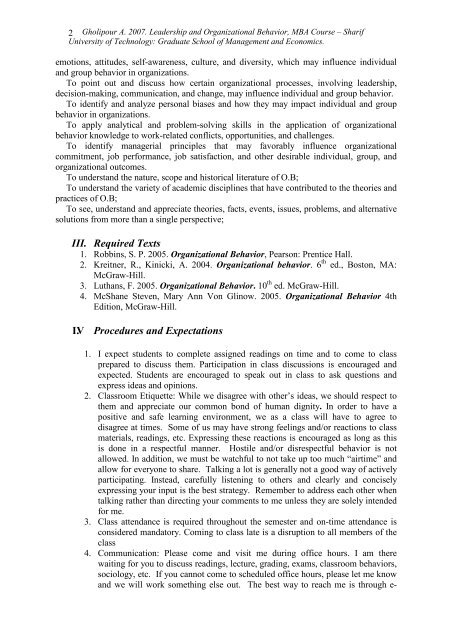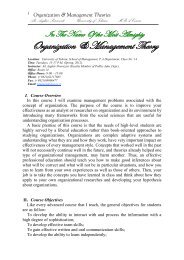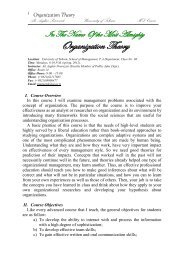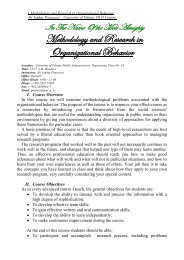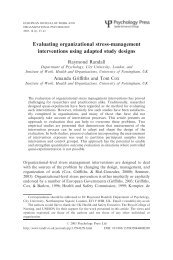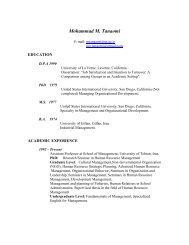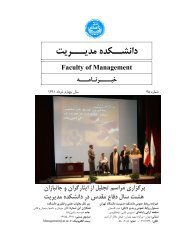Leadership and Organizational Behavior
Leadership and Organizational Behavior
Leadership and Organizational Behavior
Create successful ePaper yourself
Turn your PDF publications into a flip-book with our unique Google optimized e-Paper software.
2 Gholipour A. 2007. <strong>Leadership</strong> <strong>and</strong> <strong>Organizational</strong> <strong>Behavior</strong>, MBA Course – Sharif<br />
University of Technology: Graduate School of Management <strong>and</strong> Economics.<br />
emotions, attitudes, self-awareness, culture, <strong>and</strong> diversity, which may influence individual<br />
<strong>and</strong> group behavior in organizations.<br />
To point out <strong>and</strong> discuss how certain organizational processes, involving leadership,<br />
decision-making, communication, <strong>and</strong> change, may influence individual <strong>and</strong> group behavior.<br />
To identify <strong>and</strong> analyze personal biases <strong>and</strong> how they may impact individual <strong>and</strong> group<br />
behavior in organizations.<br />
To apply analytical <strong>and</strong> problem-solving skills in the application of organizational<br />
behavior knowledge to work-related conflicts, opportunities, <strong>and</strong> challenges.<br />
To identify managerial principles that may favorably influence organizational<br />
commitment, job performance, job satisfaction, <strong>and</strong> other desirable individual, group, <strong>and</strong><br />
organizational outcomes.<br />
To underst<strong>and</strong> the nature, scope <strong>and</strong> historical literature of O.B;<br />
To underst<strong>and</strong> the variety of academic disciplines that have contributed to the theories <strong>and</strong><br />
practices of O.B;<br />
To see, underst<strong>and</strong> <strong>and</strong> appreciate theories, facts, events, issues, problems, <strong>and</strong> alternative<br />
solutions from more than a single perspective;<br />
III. Required Texts<br />
1. Robbins, S. P. 2005. <strong>Organizational</strong> <strong>Behavior</strong>, Pearson: Prentice Hall.<br />
2. Kreitner, R., Kinicki, A. 2004. <strong>Organizational</strong> behavior. 6 th ed., Boston, MA:<br />
McGraw-Hill.<br />
3 . Luthans, F. 2005. <strong>Organizational</strong> <strong>Behavior</strong>. 10 th ed. McGraw-Hill.<br />
4. McShane Steven, Mary Ann Von Glinow. 2005. <strong>Organizational</strong> <strong>Behavior</strong> 4th<br />
Edition, McGraw-Hill.<br />
IV.<br />
Procedures <strong>and</strong> Expectations<br />
1. I expect students to complete assigned readings on time <strong>and</strong> to come to class<br />
prepared to discuss them. Participation in class discussions is encouraged <strong>and</strong><br />
expected. Students are encouraged to speak out in class to ask questions <strong>and</strong><br />
express ideas <strong>and</strong> opinions.<br />
2. Classroom Etiquette: While we disagree with other’s ideas, we should respect to<br />
them <strong>and</strong> appreciate our common bond of human dignity. In order to have a<br />
positive <strong>and</strong> safe learning environment, we as a class will have to agree to<br />
disagree at times. Some of us may have strong feelings <strong>and</strong>/or reactions to class<br />
materials, readings, etc. Expressing these reactions is encouraged as long as this<br />
is done in a respectful manner. Hostile <strong>and</strong>/or disrespectful behavior is not<br />
allowed. In addition, we must be watchful to not take up too much “airtime” <strong>and</strong><br />
allow for everyone to share. Talking a lot is generally not a good way of actively<br />
participating. Instead, carefully listening to others <strong>and</strong> clearly <strong>and</strong> concisely<br />
expressing your input is the best strategy. Remember to address each other when<br />
talking rather than directing your comments to me unless they are solely intended<br />
for me.<br />
3 . Class attendance is required throughout the semester <strong>and</strong> on-time attendance is<br />
considered m<strong>and</strong>atory. Coming to class late is a disruption to all members of the<br />
class<br />
4. Communication: Please come <strong>and</strong> visit me during office hours. I am there<br />
waiting for you to discuss readings, lecture, grading, exams, classroom behaviors,<br />
sociology, etc. If you cannot come to scheduled office hours, please let me know<br />
<strong>and</strong> we will work something else out. The best way to reach me is through e-


